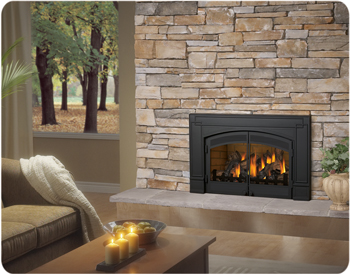 It’s that time of year again. Time to start thinking about turning on the heat again, and wondering if it’s time for an eco-upgrade to the whole heating system.
It’s that time of year again. Time to start thinking about turning on the heat again, and wondering if it’s time for an eco-upgrade to the whole heating system.
You can make your home heating more eco-friendly and more efficient by getting rid of an energy-wasting fireplace. Fireplace Inserts are designed to be vastly more efficient — 80 or 90 percent efficiency -- versus 10 percent for the old-fashioned hearth. And fireplace inserts are equally as cheerful.
Fireplace Inserts (basically a stove made to fit right inside an existing fireplace) come in a few varieties including natural gas, pellet, and wood.
Wood-burning fireplace inserts are nice because they run on a renewable resource, and one that’s often easy to source locally. Burning sustainably harvested wood is also considered carbon neutral because you’re only releasing the carbon that the tree sequestered in its lifetime; it’s part of the carbon cycle in a way that underground fossil fuels are not. Plus, an EPA-certified wood burning stove or insert is built to burn cleaner and more efficiently, dramatically reducing fine particle emissions and pollution over older models. And of course, wood fires have that ambiance going for them too.
Gas stove inserts are easier to deal with — just flip a switch, no careful fire-tending needed. But natural gas is a fossil fuel, nonrenewable, and increasingly obtained via environmentally dubious fracking.
Wood pellet inserts and stoves burn ultra-compressed wood that might otherwise have been landfilled. Pellets are super-dry, which makes them burn cleaner and more efficiently than wood. Pellet stoves and inserts do require some electricity to run, and they tend to be a bit more expensive up-front, but a pellet stove could be just the ticket for many.
And finally, there’s the electric fireplace insert — a bit like a space heater, really. These don’t produce any smoke or emissions on site, and while they’re not the most efficient way to heat a big home, one might work for a small space like your cabin. I bring this one up specifically because of your zip code: Most of the electricity in Washington comes from clean hydro-power, so you wouldn’t be committing pollution by proxy. The coziness factor of an electric fire is somewhat debatable, true, but its virtues may outweigh its vices in your case.
The best choice will depend on your budget, your house, fuel availability, and other factors. For more information and help deciding which fireplace insert will be the best for your home and lifestyle, contact West Sport in Sudbury.
grist.org

Comments
{tag_commentlist}